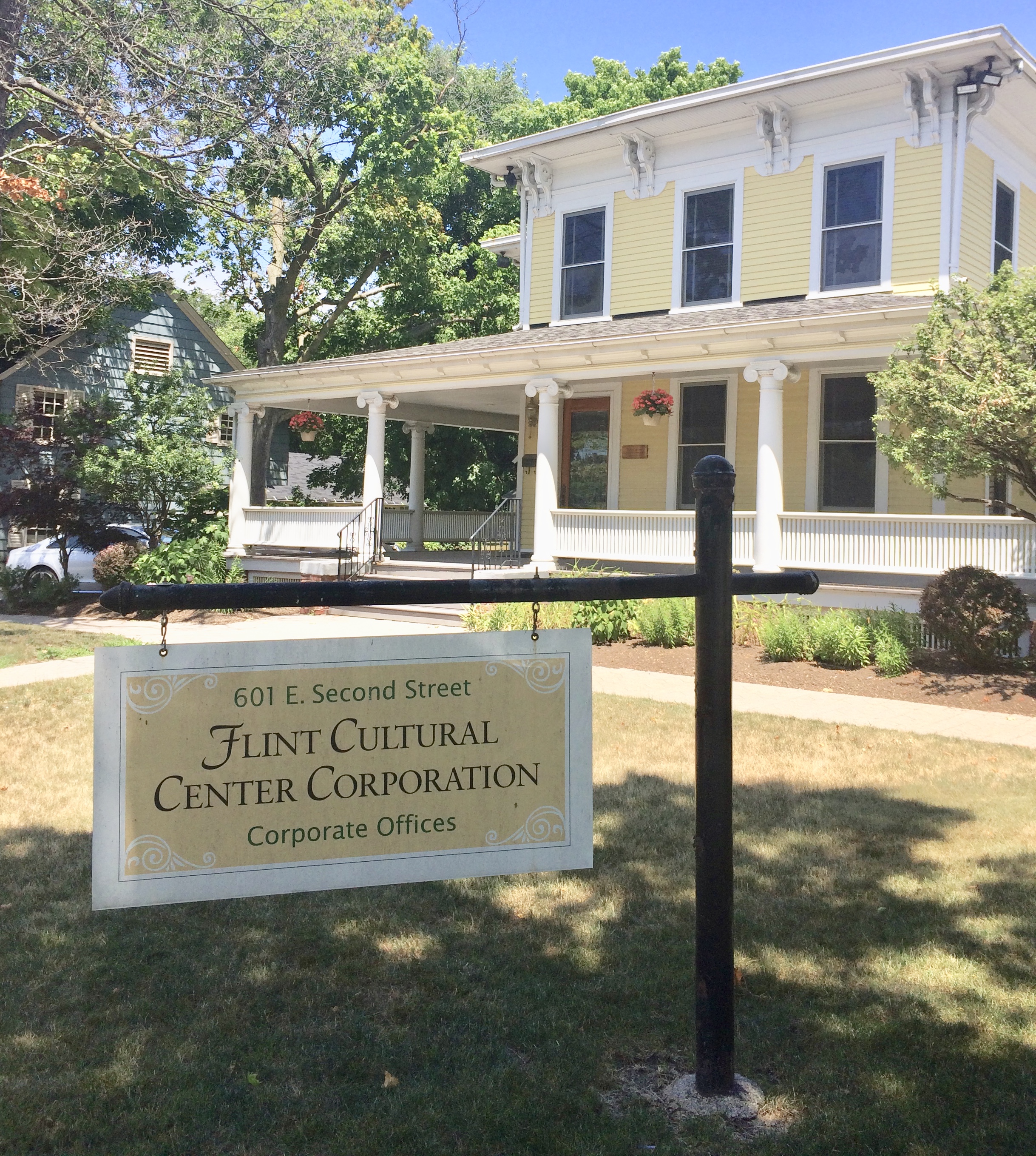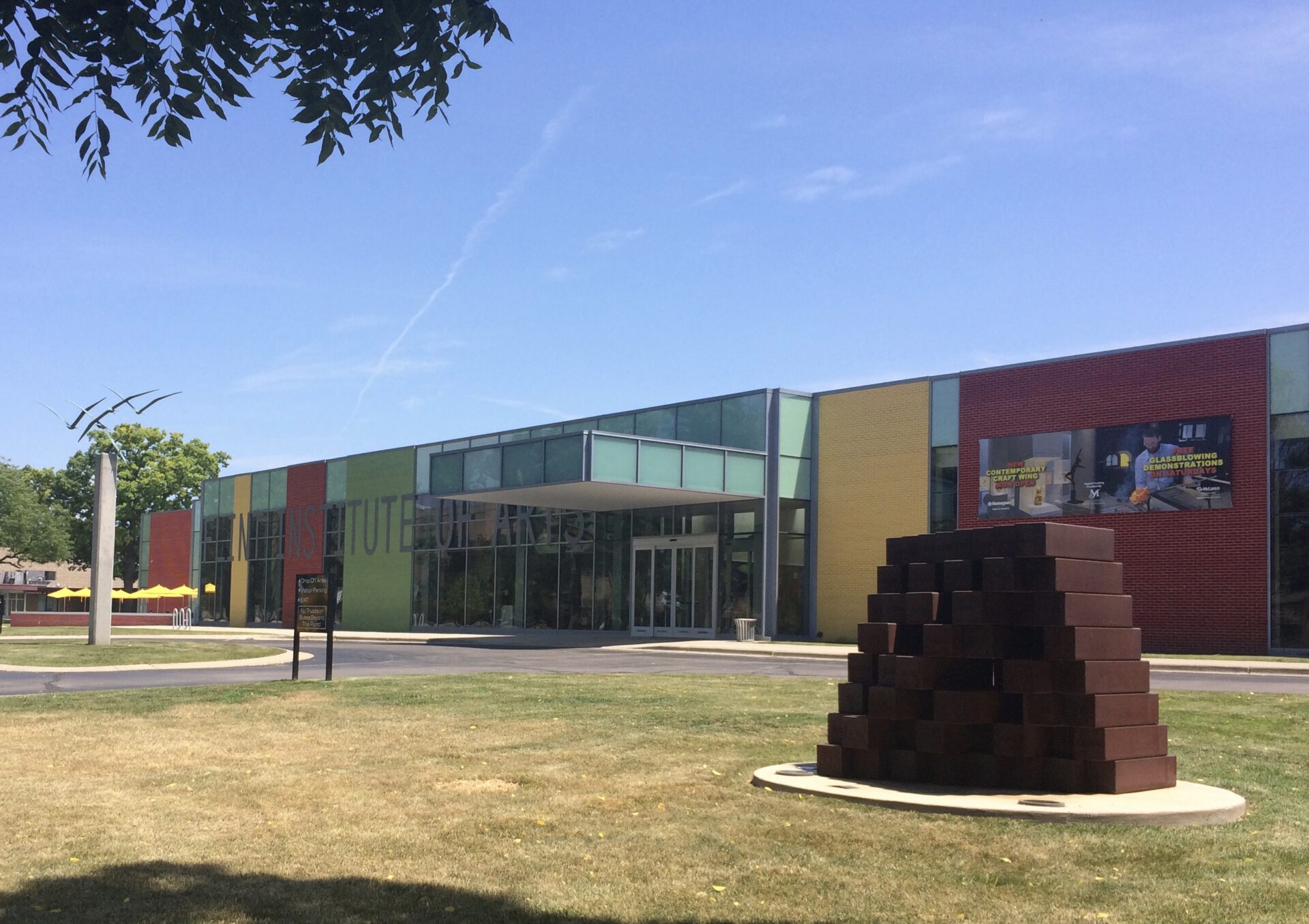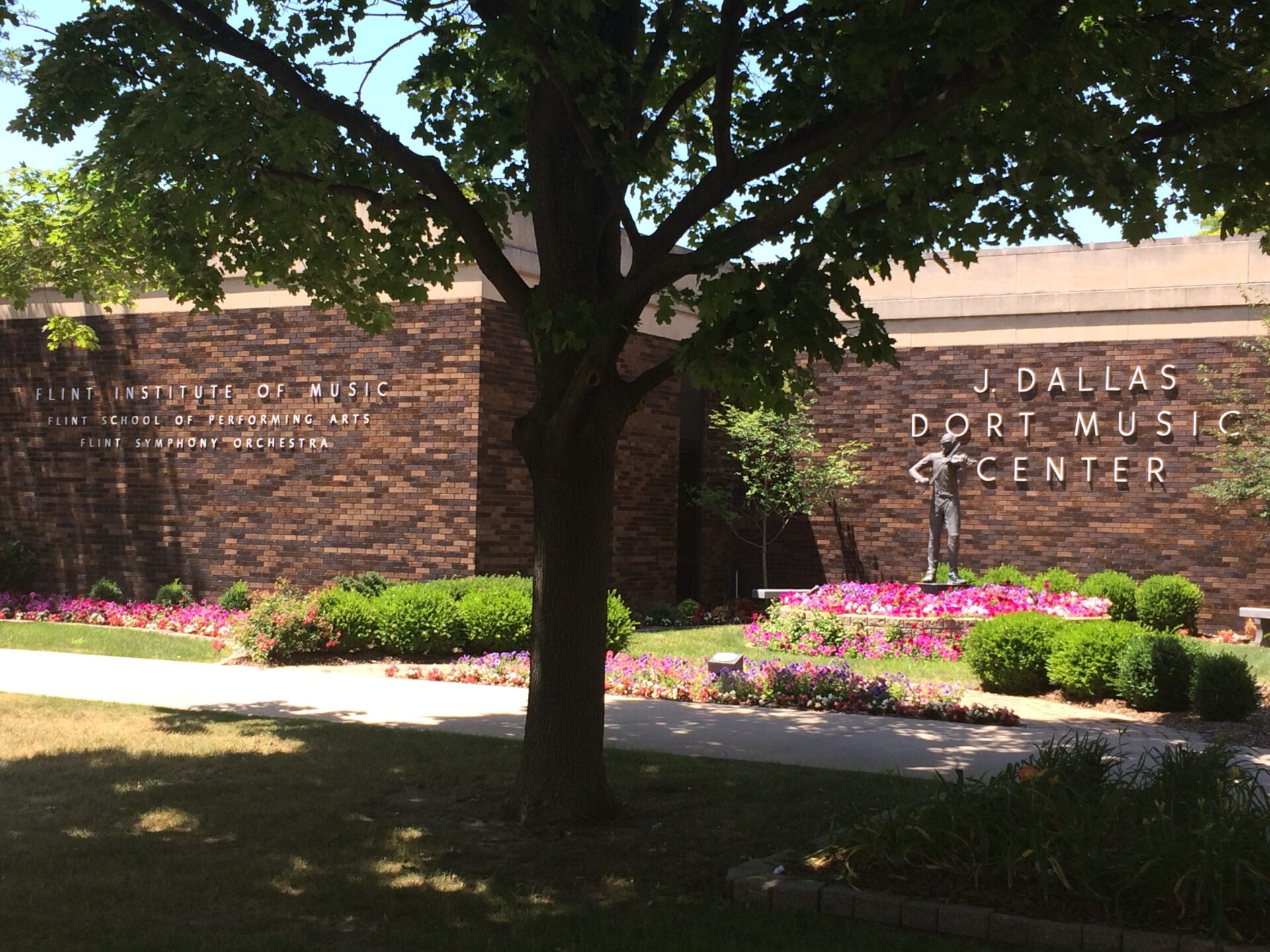By Linda Pohly
The Genesee County ballot for Aug. 7 will include a proposal for an Arts Education & Cultural Enrichment Millage. If the millage passes, according to Citizens for a Better Genesee County, the group behind the millage campaign, the County–through its taxpayers–would pay an estimated $8.2 million per year for 10 years to the Flint Cultural Center Foundation for division among three Cultural Center organizations: The Flint Institute of Music (FIM), the Flint Institute of Arts (FIA), and the Flint Cultural Center Corporation (FCCC).

Headquarters of the FCCC at East and Second streets (Photo by Jan Worth-Nelson)
The FIM includes the Flint School of Performing Arts, the Flint Symphony Orchestra, and the Flint Youth Theater. The FCCC includes Sloan•Longway, The Whiting, and the Flint Capitol Theater. All of these divisions are included by name in the proposal.
An unspecified amount of this funding would be disbursed to Berston Field House and the Floyd J. McCree Theatre and Fine Arts Centre. [Information emerging from two sources since this was written predicts each is expected to receive about $400,000 per year–Ed.]
In addition, if the millage passes, the County would pay $500,000 per year to the Greater Flint Arts Council (GFAC) for “grants to support arts education and cultural enrichment programs at other nonprofit and governmental arts and cultural institutions in Genesee County.”
The proposed millage represents a significant commitment of taxpayer funds. This is a large millage. Total property taxes levied pursuant to the millage over its term would likely exceed $87 million over 10 years. At .96 mills, the millage would be the third largest county millage, exceeded only by the millage for general operations and the millage which supports the Genesee Health Plan. It would cost the average homeowner about $48/year. The tax imposed would exceed that imposed for the entire Genesee County Parks system. It would exceed the millages for emergency medical services, veterans’ services, MSU Extension services, and animal control services, combined. If the millage passes, voters would not review the millage for renewal until 2028.
Before the voters decide, the beneficiary organizations should answer a few basic questions:
- Why do the Cultural Center organizations need this money?
From available information, it appears that the Flint Cultural Center organizations have sufficient revenues and reserves to fund current operations. The law requires that most charities file Form 990, which provides basic information about finances and governance. Usually those reports are available for public review within a year after filing. According to the most recent available reports, the three Cultural Center organizations collectively have annual revenues of about $24 million.
The FIA and FIM showed a surplus of revenues over expenditures, while the FCCC showed a modest deficit. The three organizations collectively held about $55 million in cash and marketable securities, with the FCCC holding the smallest amount. As of the most recent available 990s, the three organizations combined have endowments of about $75 million, although the FCCC endowment is much less than that of the FIA and the FIM.
Are there challenges? Let the public know

Flint Institute of Arts on Kearsley Street (Photo by Jan Worth-Nelson)
It is possible that the Cultural Center organizations face challenges not shown on currently available Forms 990. The information now available is over a year old, so it is possible that more current information would disclose more pressing financial needs. It is also possible that the beneficiary organizations have forecast declining revenues or increasing expenses that would imperil delivery of services at the current level. If so, they should make all of this information available to the voters now.
- What will the Cultural Center organizations do with this money?
It is not possible so far for a member of the public to determine the precise amounts of the millage proceeds to be allocated to the Cultural Center organizations, as there is no publically available official information about the amounts the Flint Cultural Center Foundation will pay to Friends of Berston Field House or Floyd J. McCree Theater & Fine Arts Centre. Further, if the Cultural Center allocation is $8 million per year, it would represent about a 30 percent increase in revenue to the Cultural Center organizations. The Flint Cultural Center Foundation would incur no fund-raising or program services costs to collect these monies.
If the Cultural Center organizations have plans to increase capacity or services to the public with these taxpayer monies, they have not yet made those plans public. According to the Commissioners’ resolution placing the millage on the ballot, the benefits promised Genesee County residents include free admission to the Sloan Museum and the FIA, with “selected discounts” for shows to be offered by Longway Planetarium, The Whiting, and the Capitol Theater. It does not appear that discounts would be available for special exhibits at Sloan or FIA.
Detroit arts millage asked for less and communicated more

Flint Institute of Music at the Cultural Center campus on Kearsley Street (photo by Jan Worth-Nelson)
With the increase in revenues, it should be possible to offer much more generous benefits and significantly enhanced services to the public. The Detroit Institute of Arts (DIA) is supported by .2 millages in Detroit, Oakland, and Macomb counties–less than one fourth of what Genesee County residents are being asked to pay. Residents of those counties were offered the following benefits as a part of the initial millage proposal: (a) free unlimited general museum admission;(b) discounted special exhibition tickets; ( c ) free school field trips with free bus transportation; (d) free group visits for seniors on Thursdays, with exclusive programs, and free bus transportation; (e) expanded teacher professional development programs; (f) curriculum development with school systems: (g) expanded community partnerships; and (h) DIA Away (a mobile interactive classroom for all ages, made available to schools, senior facilities, and other events). It is not clear who, if anyone, negotiated on behalf of the Genesee County taxpayers when the proposed millage was drafted. If the millage passes, the Board of Commissioners should insist on substantially increased benefits for Genesee County residents.
- Who will ensure transparency, accountability, and continuous monitoring of these public funds?
Taxpayer funds are different from foundation grants or voluntary donations. All property owners, including people who do not wish to use or support Cultural Center facilities, will be required to pay for this millage. For many reasons, including the involuntary nature of the taxing power, government spending is subject to transparency rules, such as the Freedom of Information Act and the Open Meetings Act. Although charitable organizations must comply with their own rules, government organizations are held to an even higher standard.
If the millage passes, the Board of Commissioners, who are responsible for the expenditure of all County tax funds, should insist on the same level of transparency and accountability applicable to public funds in public hands. It does not appear that Genesee County and the beneficiary organizations have yet negotiated service agreements ensuring the protection of the taxpayers’ best interests. At a minimum the Commissioners should appoint taxpayer representatives to represent the taxpayers’ interest in distribution and expenditure of these funds by the beneficiary organizations. They should demand full public accounting, at least annually, and they should ensure that the public gets significant additional value for this substantial investment of tax monies. All expenditure of these funds should be subject to the protections applicable to any other government funds.
FCC has served the community well: still, public has a right to know
The Flint Cultural Center organizations exist for the purpose of serving our community. They have served the community well for decades. No one could dispute their contribution or their value.
It does not follow, however, that their supporters must accept this proposal without question. All of the beneficiary organizations prepare to answer all of these questions when they approach donors or foundations for funds. They surely had the answers to these questions at hand before they sought taxpayer assistance.
As a demonstration of their commitment to accountability and transparency in their use of public funds, they should provide public answers to these questions and others without delay by written statement and by participation in a public forum where the taxpayers may pose questions. The individual members of their boards, those charged with governing these organizations in the public interest, should insist on nothing less.
Citizen commentator Linda Pohly is a lawyer who lives in Flint. She spent her childhood in the Civic Park neighborhood and has enjoyed the offerings of the Flint Cultural Center since she was a small child. She has followed politics closely for many years, but has become politically active only recently. She has served on several professional and nonprofit boards.


You must be logged in to post a comment.